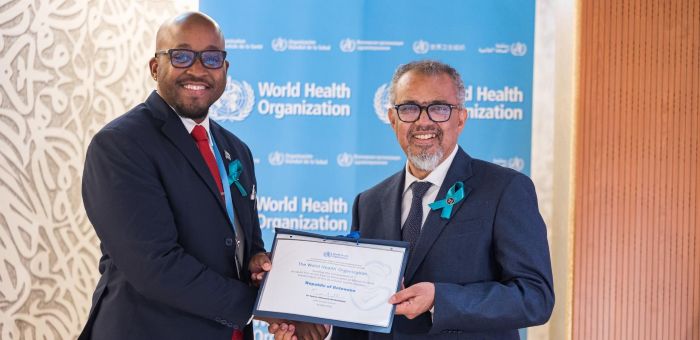(3 Minutes Read)
Botswana has become the first African nation—and the first in the world among countries with a high HIV burden—to receive the World Health Organisation’s (WHO) prestigious Gold Tier certification for eliminating mother-to-child transmission (MTCT) of HIV. This landmark achievement, officially recognised in May 2025, marks a significant milestone in global health and demonstrates the possibility of overcoming even the most entrenched epidemics through sustained public health efforts.
The designation is part of the United Nations-led Triple Elimination Initiative, which targets the eradication of vertical (mother-to-child) transmission of HIV, syphilis, and hepatitis B. According to the United Nations Population Fund (UNFPA), Botswana met the initiative’s rigorous standards, signalling not only national progress but also global momentum in the fight against preventable infections in newborns.
Botswana’s journey is particularly remarkable given its past. In the late 1990s, the country was at the epicentre of the HIV/AIDS epidemic. In 1999, it had one of the highest adult HIV prevalence rates in the world, estimated at 30%. At the time, the disease posed a severe threat to life expectancy, public health infrastructure, and socioeconomic development.
However, over the past two decades, Botswana has undertaken wide-ranging health reforms that have radically changed its trajectory. UNAIDS data reveals that by 2023, just 1.2% of infants born in the country contracted HIV, with fewer than 100 total pediatric HIV cases—a rate far below the international elimination threshold.
Key to this success was Botswana’s early adoption of Option B+, a policy that provides lifelong antiretroviral treatment (ART) to all pregnant and breastfeeding women living with HIV, regardless of their clinical stage. The country also implemented universal free access to ART for both citizens and non-citizens, making lifesaving treatment widely available.
In addition, Botswana invested heavily in its health infrastructure. The rollout of digital health tools, including the Open Medical Record System (Open-MRS), allowed for efficient tracking of patient data and treatment outcomes. Decentralised healthcare delivery through district-level management teams ensured even rural populations had access to consistent care.
Community involvement has also been vital. Civil society organisations led awareness campaigns, promoted partner-testing, created male-friendly health platforms, and worked to reduce stigma, all of which improved health-seeking behaviour and adherence to treatment protocols.
Read Also;
UNFPA emphasised that Botswana’s achievement proves that even countries hardest hit by HIV can eliminate vertical transmission through a combination of political will, innovation, investment, and inclusive, community-centred health systems.
As global health leaders celebrate Botswana’s success, it stands as a beacon for other nations still grappling with high HIV transmission rates, showing that the end of mother-to-child HIV transmission is not only possible—it is within reach.





